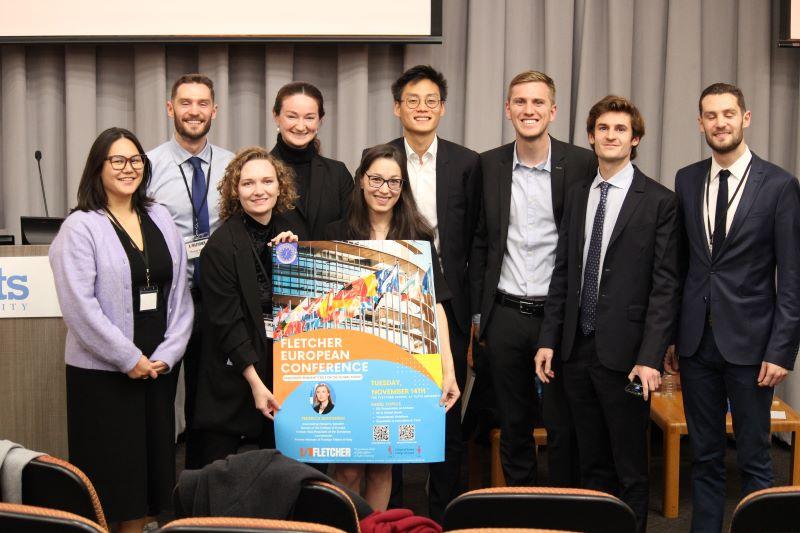-

Hear from Professor Monica Toft
Learn how Professor Monica Toft is shaping the study of global affairs and diplomacy at Fletcher.
Hear from Prof. Toft -

Explore Fletcher academics in action
Fletcher Features offers insights, innovation, stories and expertise by scholars.
Get global insights -
Get application tips right from the source
Learn tips, tricks, and behind-the-scenes insights on applying to Fletcher from our admissions counselors.
Hear from Admissions -

Research that the world is talking about
Stay up to date on the latest research, innovation, and thought leadership from our newsroom.
Stay informed -
Meet Fletcherites and their stories
Get to know our vibrant community through news stories highlighting faculty, students, and alumni.
Meet Fletcherites -

Forge your future after Fletcher
Watch to see how Fletcher prepares global thinkers for success across industries.
See the impact -

Global insights and expertise, on demand.
Need a global affairs expert for a timely and insightful take? Fletcher faculty are available for media inquiries.
Get in Touch
Should the Transatlantic Relationship Be Taken as a Given?
Fletcher students host conference to examine role of European Union on the global stage

For several decades, The Fletcher School has partnered with institutions around the world to exchange ideas, collaborate on research, and offer joint degree programs. A group of Fletcher students saw an opportunity through the school’s enduring relationships to look at a significant question in global affairs: the role of the European Union.
Last semester, a group of Fletcher students, many of whom are enrolled in the school’s joint degree programs with institutions in Europe, organized the school’s first European Conference around the theme, Can Europe Reinvent Itself on The Global Stage?
“The EU has become more and more of a geopolitical power because of the war in Ukraine and COVID,” said Vincent Puybasset F24, a dual-degree student with HEC Paris. “The conference’s first objective was to put the EU in the agenda and, if possible, to make the discussion complex. The EU is not only this massive, regulatory economic union under the supervision of Germany; its role is actually more complex.”
“For both an American audience, but also an international non-EU audience, our main goal was to show the complexity of the EU and the ongoing challenges and transformation that the EU is currently experiencing,” he added.
To bring about transatlantic discussion on campus, the group organized four panels: Europe and the Future of the Reconstruction in Ukraine; EU and the Global South; Europe, Tech, and Sustainability; and The Transatlantic Relation: Should the Ties Be Considered as a Given?
Reevaluating Europe’s Global Legacies
Reflecting upon the conference, Puybasset noted that the Global South panel invited animated discussion.
“I think that this is an ongoing discussion within the EU: how can the EU overcome its colonial legacy and build new trust?” said Puybasset. “That is absolutely necessary today for strategic reasons, given the rise of China and the Russian war. The global stage is shifting. The EU is pivoting. How can this move be seen as a new, real, and fair partnership and not a reproduction of its colonial legacy?”
May Dittel F25 remarked upon the panel’s examination of complex dynamics in her assessment of the panel as well.
“Some speakers discussed how they couldn't really move forward or trust the EU since there have not been enough reparations for the colonial past,” said Dittel. “There was this tension between the Global North and Global South speakers where the Global North speakers defended their position, that they're trying to do their best in moving forward, and the Global South partners don't believe that enough is being done.”
The conference’s final panel on the transatlantic relationship sparked similarly rich contemplation.
“Over the past few years, European leaders have become more cautious towards the United States, remembering, for instance, that Trump threatened to leave NATO,” said Puybasset. “I think that especially the younger generation of European leaders is trying more and more to renegotiate this relationship with the U.S.”
Extending the Conversation, Carrying the Transatlantic Legacy Forward
As part of the conference’s objective to engage the Fletcher community, the group was intentional in inviting speakers from the Boston area.
“It was important to us to involve folks from the Boston area to demonstrate what an EU centric career might look like across many fields, such as development and technology,” said Juliette Perrier F25, one of the conference directors and a dual-degree student with the College of Europe. “We were also excited to welcome some Fletcher alums back too, some for the first time in many decades. It was a really great way to demonstrate what a Fletcher degree can get you and the wide breadth of knowledge that you can acquire.”
Among the list of Fletcher graduates who spoke at the conference were Karen Donfried F88 FG91, who was the Assistant Secretary of State for European and Eurasian Affairs, and Consul General of Greece in Boston Symeon Tegos F14. Perrier noted that Professor Emeritus Alan Henrikson offered key insight into the history of Fletcher’s transatlantic relationship and how that has formed over several decades.
The conference concluded with remarks from Federica Mogherini, rector of the College of Europe, former Vice-President of the European Commission, and former Minister of Foreign Affairs of Italy. Mogherini’s remarks were particularly poignant, given Fletcher’s relationship with the College of Europe. Fletcher offers a joint degree with the college, the Master of Arts in Transatlantic Affairs (MATA). Students enrolled in the two-year MATA have the opportunity to study for one year at each campus.
Dittel spoke to the potential for continued collaboration with peers at the College of Europe in Bruges, and Lazaros Kyrimis F24 expressed hopes for an expanded schedule next year as well as the involvement of more partners from across Europe.
Read more about Fletcher’s joint degree programs.

